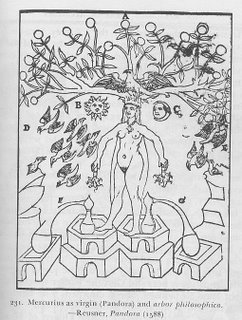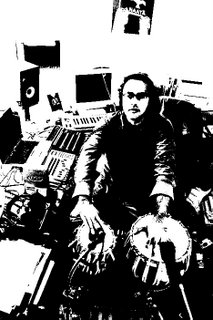
But first, some ROOTS AND WIRES HI-FI event news – STATELESS will be returning as a monthly next year, this time with a regular live component. The first will be January 28th at Amnesia in the Mission (San Francisco). More details to come soon…
Now back to the main themes - I just returned from a week-long shamanic “pilgrimage” in the Arizona Desert – it was a profound experience, one which deepened my awareness of certain transpersonal realities and also provided a moving appreciation of the Huichol healing tradition. In case you are wondering, there were no hallucinogenics or other drugs involved – in fact, these were strictly prohibited by the two shaman elders who led the workshop (Jaichima and Rutury - check this link to their website)...
Regarding Native American Shamanism, there are some fascinating accounts in Carlos Castaneda’s books, as well as in Alberto Villoldo’s material, but these stories, read from books, were initially hard to believe literally, especially when filtered through my skepticism and scientific training. This trip, as well as the personal shamanic work I have been doing over the last few years, has given me experiential validation with regards to some of these accounts. As a simple example of such "transpersonal" experience, there were certain images and symbols that had come to me during my personal meditation. These images hadn’t made sense at the time they were experienced, as they were images that I couldn’t recognize or place. Some of these images, experienced remotely in my minds eye (up to several months ago) literally came into my outer experience during the week.
Fortunately, this wasn’t a become-a-shaman-in-a-weekend thing, but rather a deep meditation on our shadow aspects and experiences, with ritual and ceremony to negotiate them. These were led by Huichol shaman elders and at their request, I can’t share most of the stories or details from the week. Part of this relates to the private, sacred nature of what transpired, and part relates to their experiences of being exploited over the years. This cautiousness is also superimposed on the deeper exploitation experienced by the Native Americans and Indigenous people. It was infuriating to hear some of their stories of violence directed towards the Native American people, as well as their ongoing experiences with racism (being called primitive, and even spat on).
As Jaichima shared, one theme that was especially touching is best expressed by the first words spoken by Huichols to their newborn: “Please teach us who you are.” How beautiful an ideal is that, to try to learn what the child's path is on its own terms, rather than trying to impose something from parent to child! This is closely paralleled by the Jungian idea of Individuation (see the quote at the top of this posting). The timing of learning this parallel ideal was especially synchronistic for me. Intending to apply this Fall for psychoanalytic candidacy, I had just attended an “open house” at the Jung Institute. The main theme expressed at the "open house," was that the Institute really supports the analysts-in-training in finding their own voice - not on becoming a “Jungian,” or rigidly internalizing certain theories. It really made it clear to me that this training is going to be part of my own path.
Another touching theme, was the Huichol's deep reverence for the earth, with a deep connection with animal and nature spirit in both physical and transpersonal realms. I remember once, when I was being led in ceremony (to the rhythm of a kaicha or rattle), I started to see a certain animal in my mind’s eye. Later, when I was discussing this experience, I was told that the animal I had seen was associated intimately with that particular ceremony. I didn’t know this beforehand, which gave me the sense that this was some sort of autonomous entity in the collective psyche. It reminds me a bit of Carl Jung’s position on ghosts – at first he viewed these solely in terms of projected complexes, later as “autonomous complexes” in the collective psyche, and finally as actual entities. There were also plenty of stories which involved powerful direct contact between human and outer, physical animals…
Music and rhythm came up as a major component of the healing work – the incantations were sang in melody, the kaicha’s (rattles) and drums provided rhythmic soundtrack, and there was also the sound of silence, at times when we weren’t speaking, at least verbally. In the Huichol belief, the Earth spins on a musical axis - it amazes me how many creation myths and cross-cultural cosmologies identify music as foundational.
During the week, I also had many conversations with the Elders and with other participants (many of whom were more a family than anything, with most having come regularly for 15-20 years), about working with the dying process…
A sad and ironic deficit in most allopathic medical training, at least in my experience, is that we don’t get much training or modeling of how to deal with death and the dying process. There are the impersonal and mechanical “morbidity and mortality” conferences in which the deceased are discussed primarily in medical terms. The emotional experience of providers is dissociated – the personal stories and the human experience often aren't part of the mix.
This really reflects a larger existential anxiety when it comes to death. It’s something we’re really not comfortable sitting with in much of “Western Culture,” if you allow me to use this construct and generalization to make a point. We don’t often celebrate people’s passings with dance and song (in addition to the necessary mourning). Instead, in a culture often focused on maintaining and prolonging our lives, it makes us anxious – we distance ourselves from reflecting upon death and engaging with those in the process of dying. Thus, patients that are dying and have no families to visit, can easily end up ignored at a time that human contact is vital.
So it becomes easy to rationalize walking by the room and doing “rounds” quickly. There’s seemingly nothing changing, so the team often steps in briefly once each day to ask if there’s any pain, and if the person can answer clearly, this physical pain is hopefully addressed (but how about psychic pain or existential distress?). If not, perhaps you step in and out in a minute or two. There’s such an emphasis on ‘doing something’ in terms of administration of medication or mechanical intervention. Maintaining life often becomes the only outcome designated a success. When there is nothing to offer in terms of mechanical intervention and when the condition becomes terminal, there can often be a sense of failure or helplessness.
When working with people who are dying, it also forces us to reflect on our own mortality, or personal experiences of loss. This causes anxiety and often leads to distancing – if you run away and don’t have to face it, the anxiety drops, but with a huge cost to those who are dying (as well as to their families). Anyway, I’ve really appreciated how important it is to offer some substantial human presence and listening at the end of life. This is even more true for those who have impoverished social networks, as do many of the homeless seen in the public hospital setting. In addition to simply offering your presence, it is often important to explore the fears and fantasies around death and the mystery afterward…
With regards to music, I think that offering personally significant music can also be valuable. I remember one man who had requested a certain CD, to play on a CD player we had checked out to him. He became delirious towards his life's end and was no longer responsive to conversation. He was incredibly agitated. When I brought him that CD, played it through his headphones, he calmed down and had a smile which he carried into his transition. It was really moving for me…
Anyway, with all this in mind, I'm thinking that it would be great to organize some sort of seminar/conference, with a strong experiential component, that addresses cross-cultural approaches towards death and dying. It’s a culturally diverse city, and our public hospital, public health care system, and medical training need to encourage more dialogue and training around these issues, as well as implement more of a system to address these often neglected psychospiritual needs of the dying and those caring for them... Let me know if you all know of anything along these lines in the public hospital setting, or if any of you have any thoughts!
- Khenu

No comments:
Post a Comment